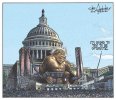Nixon resigned shortly after a recording was released from his secret Oval Office taping system. An example of how today, when a president’s motives in an official duty being not open for questions, the outcome might have been different. Nixon’s obvious criminal activity, in service to his re-election, would likely be protected.
I would know.

www.theatlantic.com
The new ruling, in effect, decriminalizes Nixon’s conduct during the Watergate scandal. As Chief Justice John Roberts explains in the majority opinion, a “President is absolutely immune from criminal prosecution for conduct within his exclusive sphere of constitutional authority.” Nixon’s activities fit right in the sphere that the Court broadly defines as “official” or “outer perimeter” behavior. According to the Court, only “unofficial conduct” is subject to prosecution.
The high court is leaving it to the U.S. District Court for the District of Columbia to determine whether Donald Trump’s conduct related to January 6, 2021, is immune, with one exception: The Court held that Trump’s conversations with his acting attorney general, which were included in his indictment as part of his scheme to overturn his election defeat, were off-limits. The Court ruled that conversations with top Justice Department attorneys qualify as official conduct and are thus precluded from criminal prosecution. In addition, the Court held that no evidence relating to such official conduct, or “outer perimeter” conduct, can be used by prosecutors. This expands criminal immunity to theoretically provide maximum protection to the institution of the presidency, because it effectively precludes establishing a president’s state of mind, which is crucial to proving criminal conduct.
While reading Roberts’s opinion, I could not escape thinking about Nixon’s “smoking gun” tape. Nixon decided to resign after a secret recording of his Oval Office conversation with his chief of staff surfaced on August 5, 1974, a bit more than two years after scandal had erupted with the June 17, 1972, arrest of operatives from Nixon’s reelection committee for breaking into the Democratic National Committee offices at the Watergate complex. This conversation, which the Watergate special prosecutor had subpoenaed and the Supreme Court had unanimously ordered Nixon to produce, ended his presidency. Here was conclusive proof of his involvement in the cover-up from the outset.
Today’s Supreme Court would likely call Nixon’s recorded actions on June 23, 1972, six days after the arrests at the Watergate, “official conduct.” What could be more official than Nixon doing what only a president had the power to do by ordering his chief of staff to tell the CIA to block the FBI’s Watergate investigation? Under
Trump v. United States, Nixon’s motive is to be ignored.




